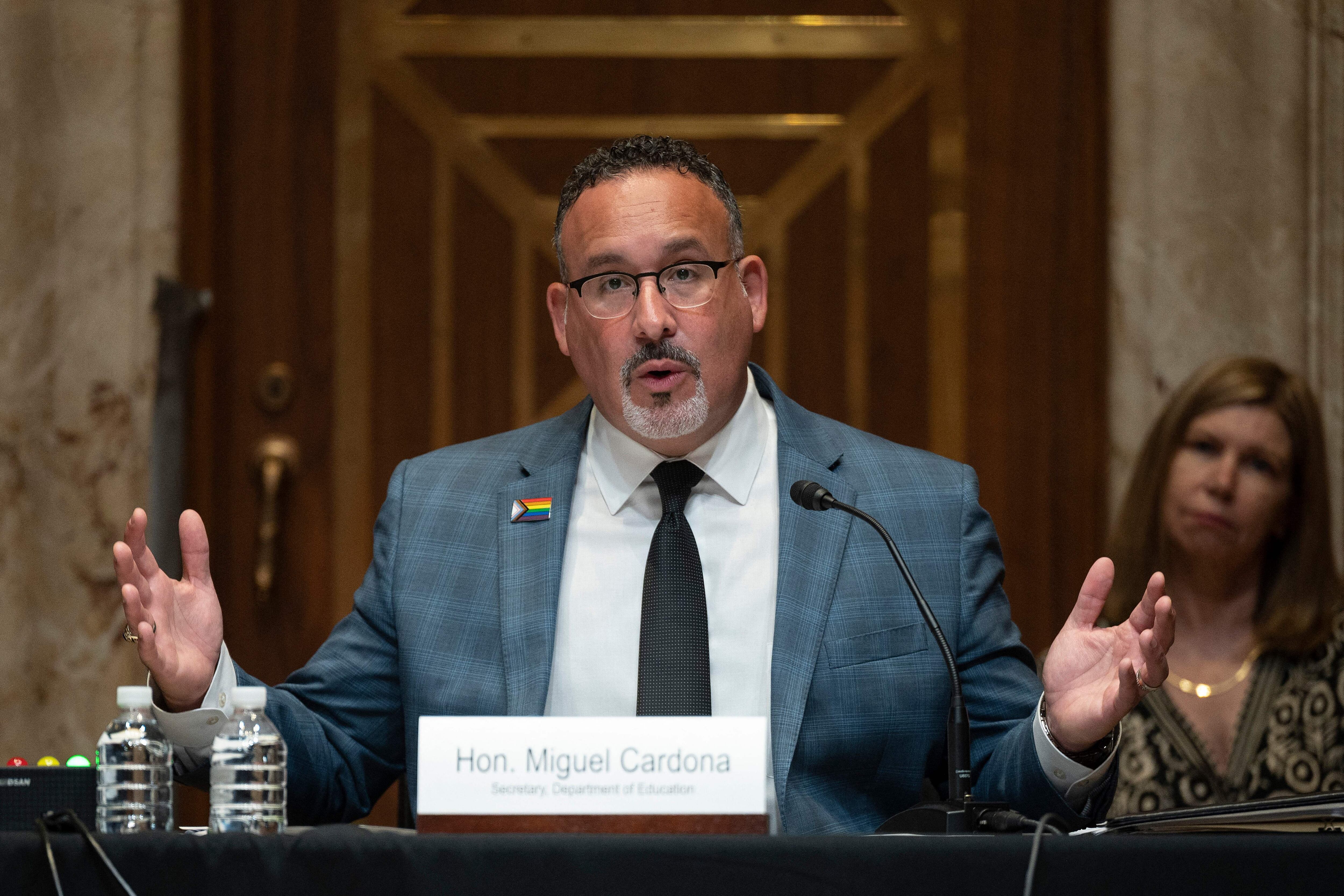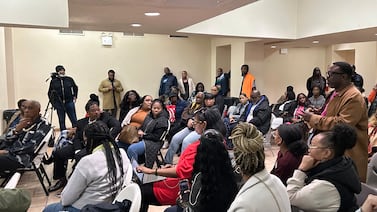Peppered with questions Thursday about whether he supports “critical race theory,” Education Secretary Miguel Cardona said that his department will leave curriculum decisions to state and local officials.
“It’s important that I reiterate at every opportunity I have that the federal government doesn’t get involved in curriculum,” he said during a hearing before the House education committee Thursday.
But he didn’t completely sidestep the issue of how racism should figure into classroom discussions, a question that has engulfed state legislatures and local school boards across the country over the last few months.
Cardona said he trusts educators to do their jobs, including teaching about the progress the country has made combatting racism. “But I think we can do that while also being honest about some of the things we’re not proud of,” he said. “Our educators across the country, I don’t think it’s an issue with them.”
And in an interview that aired Thursday evening, Cardona offered a stronger rebuke of restrictions on what can be taught in classrooms. “I don’t think we should be in the business of excluding what students are discussing or what they’re seeing for fear they can’t handle it,” he said during an event hosted by Chalkbeat and The Education Trust. “I think they can handle it and I think we can become stronger as a nation if we do it well.”
Just months ago, critical race theory was known only as a line of academic thought that argued that racism is deeply embedded in American society.
The phrase was catapulted from obscurity by the Manhattan Institute’s Christopher Rufo, who claimed that critical race theory had infiltrated the federal government and public schools. At Rufo’s urging, President Trump issued an executive order barring the concept in federal agencies. (Biden quickly rescinded it.) In the telling of critics like Rufo, critical race theory and ideas associated with it overstate the degree of racism in American society and encourage judging individuals based on their race.
Rufo and others in conservative media — as well as the experience of some parents in their local schools — have helped galvanize a far-reaching backlash to a host of efforts to address racism in schools and acknowledge racism in American history. The Manhattan Institute, a conservative think tank, recently released a toolkit for parents to combat “woke schooling.”
Those concepts include trainings that focus on white privilege or “white supremacy culture”; books for English class that emphasize racism; and the 1619 Project, a series of essays in the New York Times that recast the country’s founding as shaped by slavery and was adapted into curriculum materials for interested schools.
“It’s wrong,” said Alicia Geerlings, a parent in the suburban Philadelphia district Tredyffrin-Easttown, which was recently embroiled in debate over its equity initiative. “If you have somebody in kindergarten that learns you’re the oppressor or the oppressed based on your skin color, how are they going to make friends?”
That backlash animated many of the Republican representatives Thursday. “Are you aware of outcry and frustration right now among parents with the state of education in America?” asked Georgia Rep. Rick Allen.
Supporters counter that efforts like these are needed to address the racism that does exist in schools. “Before you adopted this amazing program … my children were called the N-word every day,” said another Tredyffrin-Easttown parent, Anita Friday. “There were scars they continue to experience.”
Others say the ideas have been misrepresented and amount to a manufactured backlash to efforts to treat people of color equally. “This is a post-George Floyd backlash,” Kimberlé Crenshaw, a law professor who helped develop critical race theory, told The New Yorker. “The reason why we’re having this conversation is that the line of scrimmage has moved.”
Nevertheless, a number of red-state legislatures have swiftly responded. Idaho, for instance, barred schools from requiring students to agree “that any sex, race, ethnicity, religion, color, or national origin is inherently superior or inferior” or that individuals are “inherently responsible for actions committed in the past by other members” of the same demographic group.
The Tennessee legislature went further. It banned a dozen concepts from the classroom, including the idea that “an individual should feel discomfort, guilt, anguish, or another form of psychological distress solely because of the individual’s race or sex.” Oklahoma passed a similar bill.
Even some conservatives have raised concerns about these laws. “The business of defining, implementing, and policing a list of prohibited ideas gets troubling real fast,” wrote Rick Hess of the American Enterprise Institute, a conservative think tank, referring to the Oklahoma legislation. “It’s inevitable that middle and high schoolers may experience race- or sex-related distress when talking about Jim Crow, the Holocaust, Korematsu, or Roe.”
Cardona’s emphasis on local control suggests that he will try to steer clear of this controversy, and he has rarely if ever brought up the issue unprompted. Plus, his department is barred by federal law from dictating what is taught in local schools. “My personal opinion on this is secondary to my role as secretary of education around curriculum, which is very limited,” Cardona said. “We don’t promote curriculum. We don’t mandate it.”
Avoiding the issue altogether proved impossible Thursday, though. The Department of Education already emerged as a lightning rod because it mentioned the 1619 Project, as well as Ibram X. Kendi, author of “How to Be an Antiracist,” in its stated priorities for a small program promoting history and civics education.
Cardona faced a number of questions about this inclusion, which he downplayed. “There was a very minor reference to an example that included that,” he said. He also suggested that such questions were political and amounted to a distraction from other work his department is undertaking.
The department will also have to sort through related federal civil rights issues. For instance, one anti–critical race theory group has filed civil rights complaints against a number of districts that have described themselves as systemically racist, saying they have essentially admitted to illegal discrimination. (This is likely intended to deter other districts from making similar acknowledgements.)
Meanwhile, Cardona has placed a major emphasis so far as education secretary on equity, with a particular focus on students from low-income families, LGTBQ students, and students of color.
Indeed, there remain large disparities in education outcomes and opportunity across American schools — and there is also evidence of outright discrimination. For instance, one recent study found that school principals were less likely to respond to an email from a parent they likely perceived as Black, compared to the same email from a white parent.
At the hearing, the conversation about “critical race theory” was dominated by Republicans who were generally critical of Cardona, claiming his department was promoting the concept. But one Democrat defended him — Connecticut Rep. Jahana Hayes, a former national teacher of the year.
“I’m a history teacher, I had to teach about the most painful parts of our history,” she said. “There are some things in our history that we just have to face head on.”






